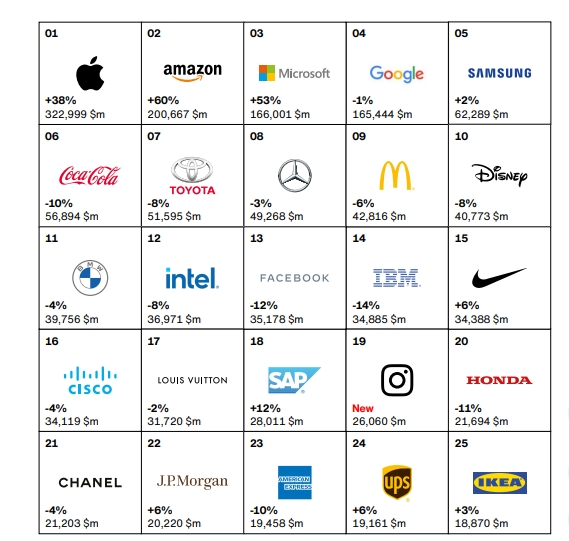The 2020 Best Global Brands ranking also saw the ‘Covid effect’.
These are the brands that have fared best in 2020 Best Global Brands ranking. These brands, says Interbrand, can help us lift our heads, make sense of chaos, and see beyond it.
Amid a global pandemic with its significant impact on business in 2020, Interbrand has announced the brands that have fared best in its 2020 Best Global Brands ranking.
As expected, social media and communication brands have fared well in the past 12 months, with Instagram (#19), YouTube (#30) and Zoom (#100) entering the rankings for the first time. Tesla has re-entered the rankings at #40 with a brand value of US$12,785m, having last appeared in the Best Global Brands table in 2017.
Media companies have also seen success among the turmoil created by Covid. Spotify (#70), saw brand value increase by 52% to US$8,389m – jumping 22 places in the ranking, while Netflix rose to #41 with a 41% increase to US$12,665m. Business models have played a role in this success, with 62% of double-digit risers relying on significant subscription model businesses.
Top Ten Brands Championing A New Decade of Possibility
Amazon was a top performer, ranking #2 and increasing brand value by 60%, with a valuation of US$200,667m. While Apple retained its top spot in the table, Microsoft’s increase in value this year (US$166,001m) means it has overtaken Google (#4) to reach the number 3 spot. Google has moved out of the top three for the first time since 2012. Meanwhile Samsung #5 (US$62,289m) has broken into the top five for the first time ever.
The remainder of the Top 10 comprises: Coca-Cola #6 (US$56,894m), Toyota #7 (US$51,595m), Mercedes-Benz #8 (US$49,268m), McDonald’s #9 (US$42,816m) and Disney #10 (US$40,773m). The top ten brands accounts for 50% of the total table value this year.
The Covid Effect
The 2020 Best Global Brands ranking also saw the ‘Covid effect’, with global shop closures causing the brand values of Zara (#35) and H&M (#37) fall 13% and 14% respectively, with both dropping at least six places in this years’ ranking. After two years as the top growing sector, luxury brands took a hit in 2020, with all but one brand value (Hermes #28) falling between 1-9%.
Other brands and industries have benefited from the ‘Covid effect’, notably logistics which saw an average of 5% growth – UPS (#24), FedEx (#75) and DHL (#81) all saw positive brand valuation growth, as the logistics sector became more central to our lives in lockdown.
PayPal (#60), Visa (#45) and Mastercard (#57) have also risen in the rankings, 12, 10 and 5 places respectively. The pandemic has seen the sudden shift to electronic as the primary payment method and the swift roll out of programs to support local business during pandemic lockdown, benefitting these trusted brands, who provide access to capital in times of economic uncertainty.
PayPal is one of the most trusted payment brands thanks to the work it has done to mitigate its customers concerns around fraud and to keep consumers’ money safe. At a time of heightened anxiety and economic uncertainty, nothing matters more.
Leadership, engagement and relevance are three consistent themes we are seeing as brands try to navigate the rapidly changing business landscape.” – Charles Trevail, Global CEO, Interbrand.
During the analysis of BGB 2020, one key question emerged – how can brands build economic resilience, individual confidence and make good on the possibility of a better future for us all? Interbrand’s analysis revealed three fundamental priorities:
- Leadership: setting a worthy purpose and a powerful ambition beyond turbulence and chaos helps brands to put a flag in the future. Tesla’s brand – its flag in the future – has driven demand and advocacy from its inception. Not only that, it has also built enormous liquidity by attracting and retaining a loyal following of retail investors.
- Engagement: great brands make consumers want to be part of their story by taking them on a shared journey.
Salesforce has seen explosive growth by listening to customer communities and celebrating them, rather than the product. The business is in constant conversation with its customers, taking them on this shared journey. - Relevance: a voice in the crowd – great brands lift consumers from indifference and make consumer choices meaningful.






